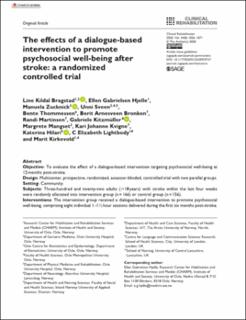The effects of a dialogue-based intervention to promote psychosocial well-being after stroke: a randomized controlled trial
Bragstad, Line Kildal; Hjelle, Ellen Gabrielsen; Zucknick, Manuela; Sveen, Unni; Thommessen, Bente; Bronken, Berit Arnesveen; Martinsen, Randi; Kitzmüller, Gabriele; Mangset, Margrete; Kvigne, Kari Johanne; Hilari, Katerina; Lightbody, C. Elizabeth; Kirkevold, Marit
Peer reviewed, Journal article
Published version
Permanent lenke
https://hdl.handle.net/11250/2679683Utgivelsesdato
2020Metadata
Vis full innførselSamlinger
Sammendrag
Objective: To evaluate the effect of a dialogue-based intervention targeting psychosocial well-being at 12 months post-stroke. Design: Multicenter, prospective, randomized, assessor-blinded, controlled trial with two parallel groups. Setting: Community. Subjects: Three-hundred and twenty-two adults (⩾18 years) with stroke within the last four weeks were randomly allocated into intervention group (n = 166) or control group (n = 156). Interventions: The intervention group received a dialogue-based intervention to promote psychosocial well-being, comprising eight individual 1–1½ hour sessions delivered during the first six months post-stroke. Main measures: The primary outcome measure was the General Health Questionnaire-28 (GHQ-28). Secondary outcome measures included the Stroke and Aphasia Quality of Life Scale-39g, the Sense of Coherence scale, and the Yale Brown single-item questionnaire. Results: The mean (SD) age of the participants was 66.8 (12.1) years in the intervention group and 65.7 (13.3) years in the control group. At 12 months post-stroke, the mean (SE) GHQ-28 score was 20.6 (0.84) in the intervention group and 19.9 (0.85) in the control group. There were no between-group differences in psychosocial well-being at 12 months post-stroke (mean difference: −0.74, 95% confidence interval (CI): −3.08, 1.60). The secondary outcomes showed no statistically significant between-group difference in health-related quality of life, sense of coherence, or depression at 12 months. Conclusion: The results of this trial did not demonstrate lower levels of emotional distress and anxiety or higher levels of health-related quality of life in the intervention group (dialogue-based intervention) as compared to the control group (usual care) at 12 months post-stroke.
